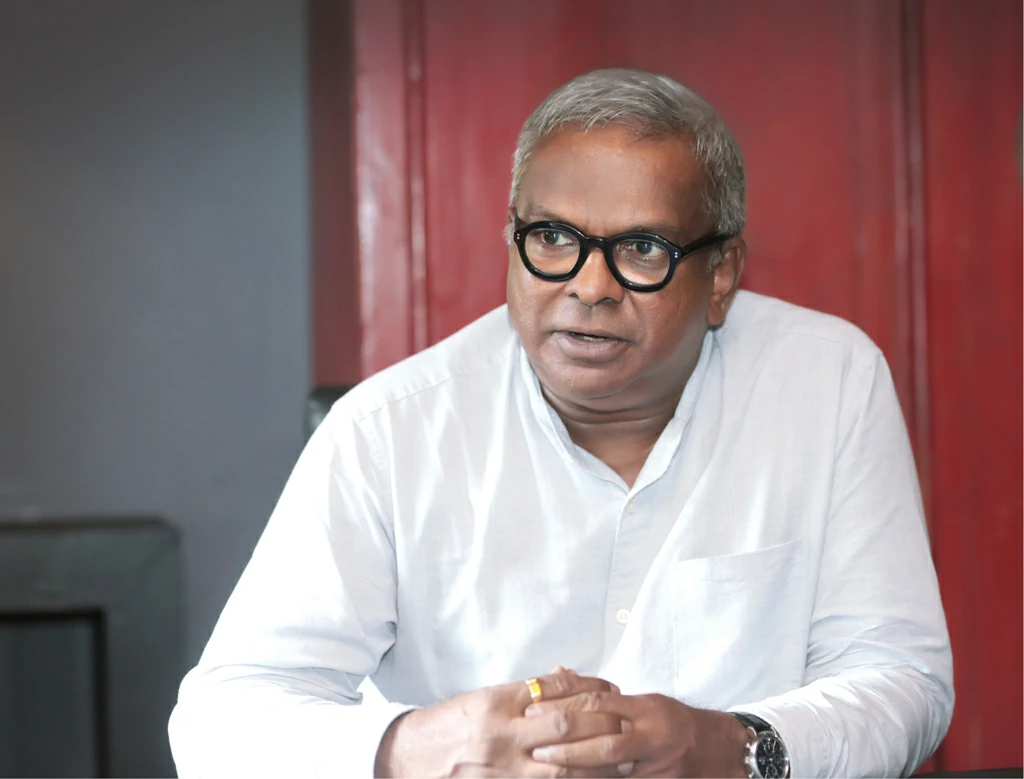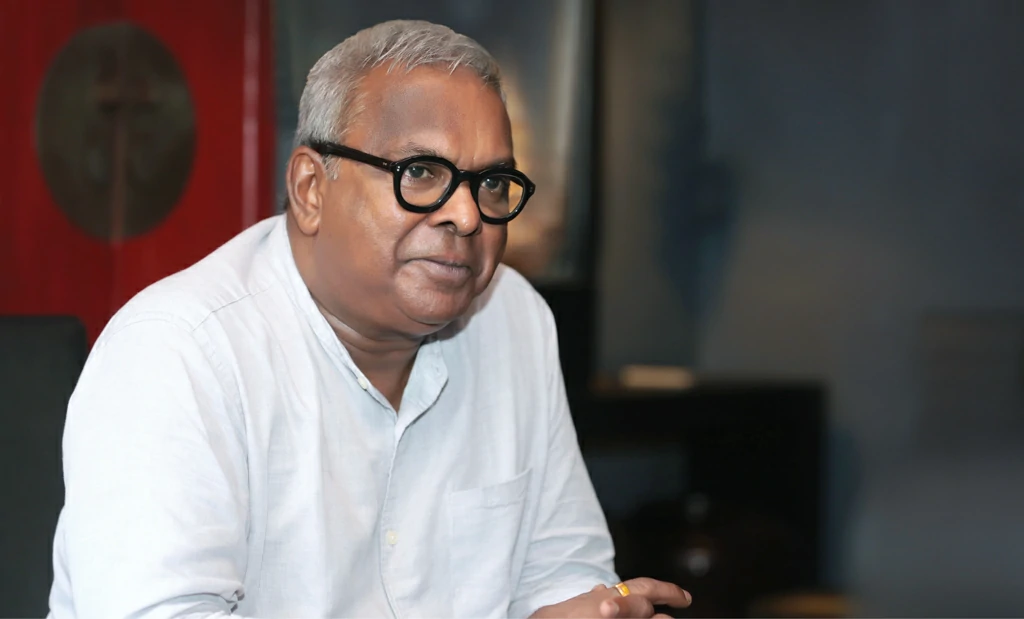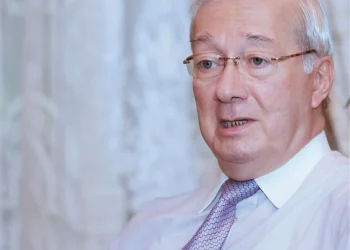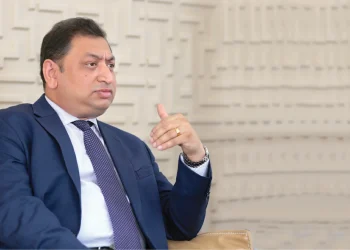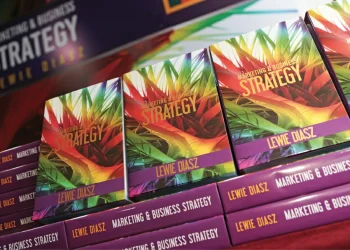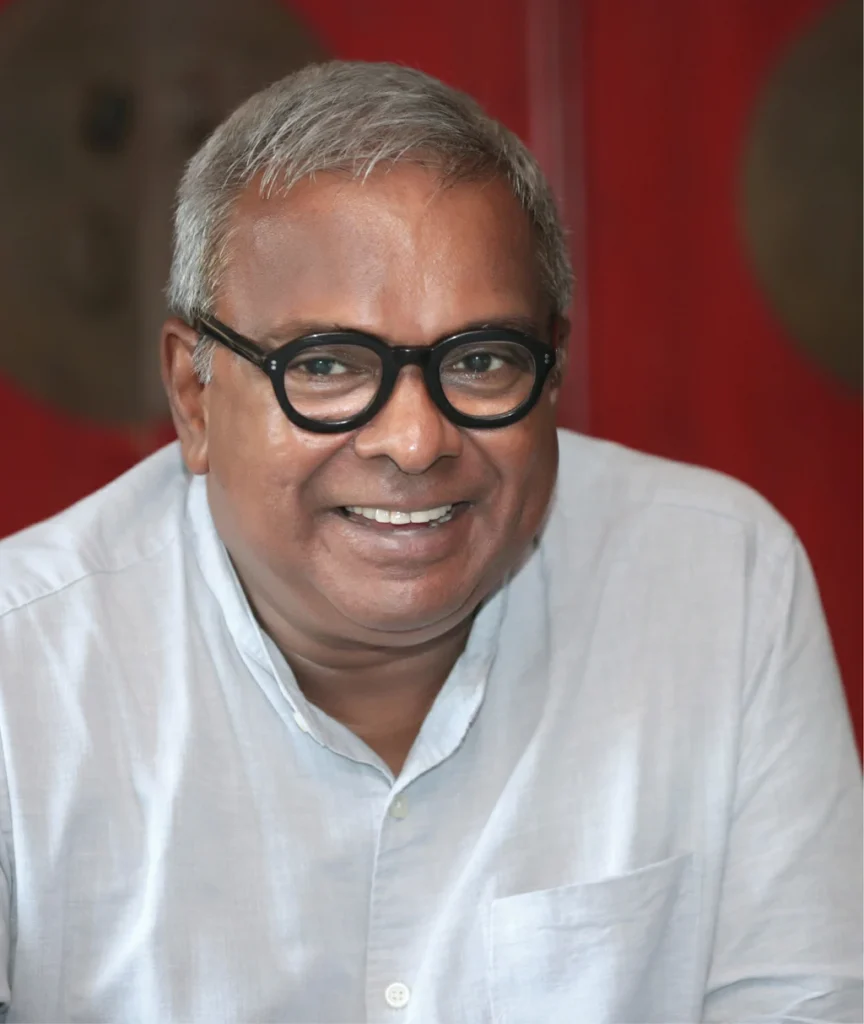
Paradise Road celebrates 30 years since transforming the design and retail landscape in Sri Lanka. When the design store opened on July 13, 1987, it introduced to Colombo a timeless taste and eclectic elegance through a unique monochrome theme. Paradise Road is essentially an expression of self of Udayshanth Fernando, the brand’s Founder and Chairman. Three decades later, Fernando’s concept has expanded and materialised as restaurants, hotels and a commercial platform for art. Udayshanth Fernando speaks about his ‘labour of love’ in introducing his own style to Sri Lanka.
By Keshini de Silva | Photography Mahesh Bandara and Menaka Aravinda
You are celebrating 30 years of creating Timelessness and Elegance in Sri Lanka. You have built your brand by yourself, while overcoming many challenges. Can you tell us about your journey?
I returned to Sri Lanka from Australia in 1987. As the merchandise I sold in Australia was imported from Sri Lanka, I decided to operate my businesses from here. I travelled to Sydney approximately three to four times a year and eventually realised that I was bored and needed something to do.
That is when I saw the opportunity to open a retail store. The style in Sri Lanka at the time was very dated and staid. There was no change although the world around was changing the style of living. What I do sell is refined taste; a taste in living, a taste in food, and a taste in style. I always use this wonderful expression; “You can learn or buy style, but not taste.”
Taste is something you believe in wholeheartedly and it has nothing to do with money. Taste comes from within yourself. Taste is something you cannot buy. It must be acquired. Today I can turn around and say that within 30 years I created a brand, an exclusive one, and have been successful.
Taste Is Something You Believe In Wholeheartedly And It Has Nothing To Do With Money.
I started Paradise Road with a retail store along Flower Road. This expanded to a larger store, which is today my flagship store, on Dharmapala Mawatha. Later we opened, The Gallery Café, when Geoffrey Bawa entrusted his former office building in my care. Once the house next door became available I opened another retail store called The Paradise Road Studio. The latest retail addition is the Paradise Road Collection also on Dharmapala Mawatha.
Subsequent to the opening of The Gallery Café, 19 years ago, people asked “What next?”. They suggested that I open a hotel. No one in Sri Lanka was aware that I am a hotelier by profession. At the age of twenty, I managed a 16-room hotel called Lake Lodge, which is still in existence, it belongs to my sister. When I was 21, I opened a five-room guest house of my own in Mount Lavinia. Later, I worked in the hospitality industry in the Netherlands, New Zealand and Australia. Essentially, I am a hotelier, but my first love and passion is art and design. To me living well and designing is a passion. At Paradise Road, every single product is designed by me or put together by me. Therefore, Paradise Road is actually an expression of myself.
To achieve what I have in Sri Lanka is not easy. There is intense competition, and there are many who attempt to limit you. However, I continued to fight through. The person who gave me the best advice, a good acquaintance of mine who, walked into my store on Flower Road, said, “Succeed and work on your own. Row your own boat. Do not let other people come and influence you. And do not join any groups.”
In Sri Lanka I am thought to be an arrogant person. However, arrogance is only a façade that provides me space and time to create. To me, life is not about earning money, but about being successful. People do not know who I am, because I play shy of people. Even when I host a gallery opening, I walk into the opening, yet sit on a side, discreetly. I do not socialise, because I believe in only moving around with people who understand me, those who have similar interests and those who click with me. I am essentially a private person. But I defend myself. In life, if you do not defend yourself there will be no one to defend you. I have stood up for myself, because I believe in what I do and in what I say.
In Sri Lanka I Am Thought To Be An Arrogant Person. However, Arrogance Is Only A Façade That Provides Me Space And Time To Create. To Me, Life Is Not About Earning Money, But About Being Successful.
Today, every single business, which I have been involved in, and the Lord be praised, has succeeded. Therefore, the advice I give any businessman is, “be ambitious for success, and not for money.” Because if you go after money you will never succeed. In this country, where there is a lot of jealousy, envy, where people have created a noblesse, and strongly believe certain things belong to them, I was rejected. However, I forged ahead and today I am a self-made man.
In my life, I have achieved everything by myself. I have never borrowed money, I made money. I have never sought political favours. After all nothing in life comes for free. Those are the principles by which I live by. Presidents Chandrika Kumaratunge, Mahinda Rajapaksa and even the current President Maithripala Sirisena and Premier Ranil Wickremesinghe have dined at The Gallery Café.
Another important aspect is that I do not like commercialism. The only advertising, that I have engaged in consistently is with Explore Sri Lanka magazine. Although now and again, there are those who I cannot say no to and I like to encourage people to succeed. Especially, when they are starting businesses if you do not give them encouragement and hope, and do not contribute to their coffer, it is difficult for them to succeed. I know this from experience as for six months when I started Paradise Road I did not have any local customers. They simply did not understand what I was creating.
From being a retailer, to a restaurateur, a gallerist and later hotelier, through Paradise Road I created a concept. Fortunately for me, and again I say God be praised, I have two daughters who have rubbed off me. One is an interior designer and designer who has a successful concept store called PR; a play of words as it is called Paradise Road Public Relations. My younger daughter, who has worked with me, is Sri Lanka’s foremost gallerist dealing in contemporary art with her Saskia Fernando Gallery and jewellery design business “Papillon Du Thé”. Therefore, I have attained a legacy that many people do not have. However, my children work separately, they do not work with me. I find it extremely difficult to work with people. I am an independent person who does not believe in partners. When someone asks me about partners, and it is mentioned in a previous issue of Business Today, I have always said “partners are meant for dancing”. It is true, because I put by heart and soul into my ventures. One cannot buy that for money. Therefore, if I have a partner, the partner may have different ambitions.
Mr Bawa’s Old Office, Which I Transformed Into The The Gallery Café, Was One Of My Favourite Buildings In Colombo And It Was Entrusted To Me By Him Because He Had Faith In Me.
I know what I want in life and have thus succeeded. It took me 30 years to move into the home of my dreams. That too is from my own making. I do not borrow and I do not steal, I am 100 per cent honest and transparent – I do not keep double books. I pay my taxes to the cent. No one can accuse me of undervaluing an import into Sri Lanka.
I was born to a good family that afforded me a good foundation. I went to St Thomas’ College, Mount Lavinia where in every year of my school career I won the art prize. Thus, I had a God-given talent. It was this talent that has propelled me to where I am today. I had a home where food, caring and sharing was very important; living was important. My mother recognised my talent in art and even took some of my paintings to the distinguished painter George Keyt to obtain his advice. To which he asked her to provide me with paint and paper and encourage me to continue to paint.
I have a wonderful family structure; my wife assists me where the food and detailing is concerned in all my hotels and restaurants. I operate these establishments myself and I take critique only from my family. I do not take it from outside. When there is criticism from someone outside, I first analyse the reason for that critique. Thereafter, I will take necessary action.
Paradise Road Is A Labour Of Love And Self Expression Of Myself That The Country Has Made A Success.
Paradise Road is a labour of love and self expression of myself that the country has made a success. I have received offers from all over the world to franchise my store. In India, I have calls from rich individuals ready to fund a store, but I am not interested. When they pitch saying “You know this is India”, I would say “well yes, but this is Sri Lanka!”. In actuality I can sell, but it is not just about selling. It is also about the people that I deal with. The crafts people I work with have small operations. They are from rural villages and I have also uplifted them, although some have been stolen by competitors. I have faced an experience where my entire store was duplicated. But it does not really matter because behind every idea that is stolen there is another; because these concepts come from within.
I have created a timeless style. I do not have to change anything. The Gallery Café as well as its table cloth that I designed 19 years ago are still successful. Mr Bawa’s old office, which I transformed into the The Gallery Café, was one of my favourite buildings in Colombo and it was entrusted to me by him because he had faith in me. He was a good acquaintance of my family and myself; but I was not a friend. Because if I was a friend, Mr Bawa would not have given me this building.
On the other hand, I contradict myself, because Sunethra Banadaranaike, a friend, leased her ancestral home to me. She was trying to dispose of the furniture at Tintagel and called me for advice. She further said that she had to raise a loan to air-condition the house and build more toilets as the Pakistani Embassy would be renting it. After inquiring on the rent, I said to her, “Why don’t you rent it to me.” This is where I turn around and say, where opportunity knocks, I answer. It took me two years and eight months to transform Tintagel to what it is today. I paid Sunethra Banadaranaike rent from the very first day because there is nothing called a free lunch. I am not indebted to her, and she is not indebted to me. I paid rent for the first two years and eight months’ despite not earning an income. I undertook the entire project with my own earnings; I did not obtain a loan, and Sunethra Banadaranaike and her family do not have any shares in the business. The singular business connection is that I pay a monthly rent. I have never, praise God, had to delay rent payments on any of my establishments. Every single business I own is on a leased property, except for warehousing. My life too is leased; I am only passing through. I am not going to take any of this away with me. My father, who worked very hard, left me ten houses. Before I was old enough to inherit the properties they were nationalised and I have never sought for compensation. In fact, I have earned 100 times more than what my father left me and in better locations too.
I Visit Many Trade Fairs Overseas, Unfortunately, There Are Those Who Follow Me And Bring In The Same Products. It Is Said That Imitation Is Flattery, But I Believe Duplication Is Obscene.
I am a head strong person, who firmly believes in my personal convictions. I have a style and design sense, which I believe in and which in turn has earned me what I possess today. I am quite content and I compete with no one. However, I research, travel the world and import from overseas. I visit many trade fairs overseas, unfortunately, there are those who follow me and bring in the same products. It is said that imitation is flattery, but I believe duplication is obscene.
You changed much of the retail sector and elevated the shopping experience in the country. Could you elaborate on this?
At the time I returned to Sri Lanka, stores would open at nine in the morning and close at five in the evening. Saturday was a half day, similar to government office work hours. Having lived in Australia and after selling to retailers in Australia I realised the biggest day for sale is Sunday, when families are free to shop together. Therefore, I changed the retail times in this country to ten am to seven pm, very few know of that. I opened on all days of the week, even on public holidays. The only holidays my establishments have in retail are Independence Day, the Sinhalese and Tamil New Year, May Day, Vesak and Christmas Day. The hotels are of course open all year round. I believe there is no holiday as such, only a way of living.
Furthermore, at that time Sri Lankan stores did not offer a gift wrapping service. If you travelled from overseas, you brought your own wrapping paper. Through one of my buyers in Australia, who had a beautiful store called Gift Maker that used colourful tissues I was inspired. I knew we had plenty of tissue paper in Sri Lanka because we import this material to make kites. Thereafter, I started buying reams and reams of it and we created our packaging. Sometimes I take the tissue paper, crumble it and open it out, so that it looks like crepe. Paradise Road has over time become more creative. Today, I cannot wrap as nicely as my staff could. However, today I can go to a wedding anywhere and recognise the Paradise Road gifts. I travel to Europe and at the airports I may see a Paradise Road bag; what greater recognition could one receive? Today, I have introduced gift bottle bags, because now in Sri Lanka people have got into the style of taking a bottle of wine when they are invited to dinner, and they all look for packaging. Usually, they would bring back gift bottle bags from overseas, which quite often could be over-designed. But now you can buy them in the Paradise Road style; in iconic black and brown stripes.
I constantly search for ideas. Remember designing is a variation of a theme, it has all been done before. Yet, you interpret these ideas according to your constraints and style.
You have strived to recognise Sri Lankan talents, artists and craftsmen. Can you elaborate on this?
I was already aware of the artistic ability of Sri Lankans through the company, which I was working with to import merchandise into Australia; Magpek, which is no longer in business. I witnessed the skill of Sri Lankans at the exhibition held by an aid organisation called Silpa orgainised by architect Tilak Samarawickrema, where they had elevated designs of Sri Lankan crafts. From simple to beautiful products and even the reproductions of antiques; there I saw the opportunity. Subsequently, I saw a shop along Flower Road, which had just been built, and I saw that it had potential.
When people speak of Shanth Fernando, they speak of monochrome, I am essentially black and white. I had the idea, the next step was to find the product. Thereafter, I travelled to villages found traditional cane ware and tools, which I hand painted white or black, or gave a touch of finesse too, to create products that were so international in the taste of the time, that many foreigners rushed into purchase them.
When People Speak Of Shanth Fernando, They Speak Of Monochrome, I Am Essentially Black And White.
Mind you, I used to work from ten am to seven pm, therefore I would wake up at five in the morning to visit the crafts villages. I used to drive to places such as Matale in an old Volkswagen Beetle that did not even have a petrol gauge. Together with the craftsmen I developed their crafts into saleable products. Today, when I walk into the handicraft shops in Colombo I see my signature on many of the products although I do not claim it. It was I who changed lacquerware into stripes: black and white, red and yellow, dark blue and light blue. I utilised batik as a method of printing because my designs are geometric; I used vertical stripes, diagonal stripes and checks. It is usually two lines and the design with the cracking of the wax that looks like marble in between. I was able to contact a craftsman who used to work for Ena de Silva, the foremost Sri Lankan designer to shine in the batik industry. After she closed her business, this batik craftsman continued working for me for the past 30 years.
A few months after I opened Paradise Road, Geoffrey Bawa came in and purchased a house warming gift for Sunethra Bandaranaike for whom he had built a house. Before giving it to her, of course he copied it for himself. That is how Mr Bawa got acquainted with my store. Mr Bawa would come into the store at least once a month and also introduce me to some of the best architects in the world, who are still my friends and customers. Today I am known by many in the design world, because he introduced me and in turn I have shared that courtesy. Geoffrey Bawa purchased two batik cushion covers from me, with diagonal black and white stripes, which to date are in his living room at Bagatelle Road.
Therefore, I have created certain products, which are essentially the signature of Paradise Road. When people ask me who I am, I say I am “Mr Paradise Road”. That is who I am. Many craftsmen have developed with me and bettered themselves, but unfortunately in Sri Lanka, the average Sinhalese craftsman can never say no as it is a part of our culture. Thus, if someone requests them to reproduce what I have taught them, these producers cannot say no. Therefore, the blame rests on the person who makes the request. In life we should help others to succeed and I have financially helped these people. I have given them money, that I have lost at times. But, really I have not lost because in the Bible it has been said, ‘do not let your left hand know what your right hand giveth’. I have my Christian principles, yet I could also go to a kovil or temple. If you walk into my house you will wonder which religion, I belong to because my house is filled with objet d’art from all religions. I have six or seven statues of Lord Ganesh in my house and I have Buddha statues as well. In my heart I am a Christian, displaying an enormous cross on the wall and the square window above looks out at a Bo tree. However, I have one room, which is absolutely Christian displaying an enormous cross on the wall, and the window above. What is religion? I say it is the difference in knowing what is good or evil. I believe a good conscience never fails and we ultimately reap what we sow.
You have worked closely with artists in Sri Lanka and overseas. What are your thoughts on this?
The Gallery Café, became a platform for Sri Lankan artists. I changed the entire idea of an exhibition preview. I was the first to serve red wine, white wine and beer along with canapés. Initially, artists did not understand how to behave, however I spoke to the likes of Jagath Weerasinghe on communicating with artists and changed the entire sphere. The artist you see exhibited at The Gallery Café today, Sanjeewa Kumara, is a young boy I discovered at the George Keyts Foundation, Kala Pola. To date, he has had 16 exhibitions with me. In his last exhibition, 17 of 22 pieces were sold. His first exhibition with Paradise Road was a sellout and he won himself a scholarship to read for his Masters in the Netherlands. It was a success he achieved through opportunity.
During a SAARC exhibition I met an artist in Pakistan, from whom I purchased two artworks and suggested my friend purchase another. I invited him for an exhibition at The Gallery Café, as it is important for our artists to be exposed to work from across the world. A year later he called and said he was ready. His collection was on the theme of erotic art, which he could not exhibit in Pakistan due to cultural limits. We had a very successful exhibition in Sri Lanka. Today, this artist who sold for 600 – 700 US dollars at my gallery, sells pieces for 30,000 – 40,000 US dollars in the international art market.
One of the biggest problems that I have seen in Sri Lanka is that artists do not spend time on their work. They want quick money and do not understand the progress they must make to develop themselves. On the other hand, they cannot afford to do so as the cost of living in Sri Lanka is high. Furthermore, competition is too great. Another problem in Sri Lanka’s art world is that our college of aesthetic studies is in the most expensive part of Colombo – Horton Place. The students are mostly from the village, who cannot afford to live in Colombo. When they see the wealthy of Colombo driving their expensive vehicles and hosting children’s parties with merry-go-rounds, they have a culture shock. Therefore, you would see a lot of negativity in their work.
I Had Done My Homework In Style, In Terms Of Using Antiques Together With Contemporary Or Modern Furniture. That Is Also Mr Bawa’s Style, But Mr Bawa’s Style Was More Colonial.
Yet, none of the Governments elected in Sri Lanka have been wise enough to identify and comprehend this, and take measures to sell that prime property, and use the money to build an art school, similar to the one in Shantiniketan in Kolkata, in a place such as Hantana, where the surroundings are quite salubrious and art students have inspiration from nature.
I have a very important Sri Lankan art collection, in my private gallery, which in the future shall be open to discerning art lovers and the students who need to understand art. My private gallery is not a status symbol. It is a collection of an obsessive art collector. My collection of art has every member of the ‘43 Group Sri Lankan art movement, featuring some in multiples. I have at least 30 artworks from L T P Manjusri and over a dozen by George Keyt dating back to 1930. My life has revolved around what I love; art and design. Today, I can talk to anyone on art and design because I am up-to-date and do much research. I have a huge library on the subject, which I treasure. Because my reading material is my education.
You introduced a new way of looking at design, as well as interiors and interior furnishing/decor. What can you tell us about this?
It is a monochrome palette. I believe in a neutral palette where you bring colour into spaces from objects and art. There is quite a wonderful saying that, “The house is like its master.” When I walk into a person’s house I can psychoanalyse a person because it reflects their taste, sense of colour and sense of style. You could tell whether they are clean, dirty or sensitive by walking into these spaces.
Before I introduced my sense of style to Sri Lanka, I did research in a lovely country. Australia was a great place for research as it had an upcoming society interested in art and living. Many beautiful magazines were being launched when I lived there, including Vogue Living and Belle magazine. I have been featured in them, and even when I moved to Sri Lanka, my home was featured in the Belle magazine in Australia and Côté Sud from France.
One Of The Biggest Problems That I Have Seen In Sri Lanka Is That Artists Do Not Spend Time On Their Work. They Want Quick Money And Do Not Understand The Progress They Must Make To Develop Themselves. On The Other Hand, They Cannot Afford To Do So As The Cost Of Living In Sri Lanka Is High.
I had done my homework in style, in terms of using antiques together with contemporary or modern furniture. That is also Mr Bawa’s style, but Mr Bawa’s style was more colonial. I introduced classic chesterfield sofas to combine with antiques, thereby making it more interesting. I brought in an eclectic style into Sri Lanka, which I am identified with. You can read many an article, which says I am the Terence Conran of Sri Lanka. I am Udayshanth Fernando, not Terence Conran, yet I know what Terence Conran did, and I like and believed in what he transformed.
Your name is inherently linked with Geoffrey Bawa, what are your thoughts on this?
Mr Geoffrey Bawa was a very good acquaintance. He was a man who I respect and till today I will never call him by his Christian name; I call him Mr Bawa. Even when I met him I never called him Geoffrey because I respected him for what he achieved; for what he was to Sri Lanka, to architecture and for creating a distinct style of living.
Mr Bawa became a good acquaintance and loved coming to dinner at my home. He coveted things I owned, which I did not let him have. In fact, I had a fifth century elephant, which Mr Bawa admired, however I never gave it to him. When I got two similar elephants, I gifted them to him for Christmas; it stands in his house even today. Therefore, the link was through respect. He respected what I did and I had a greater respect for what he did in creating a style in Sri Lanka, which I appreciate and am sensitive to.
In Terms Of Sri Lanka, I Thought, We Are Known As A Paradise Island And The Name Paradise Road Further Refers To A Direction. That Is How ‘Paradise Road’ Came Into Being.
Your thoughts on design and architecture in Sri Lanka?
Geoffrey Bawa was a very versatile architect in Sri Lanka who became the yardstick. There are very few architects in Sri Lanka who have managed to create a signature for themselves.
Geoffrey Bawa was extraordinary or else he would not have been selected for the most coveted Aga Kahn award for architecture. Mr Bawa’s design was never repetitive, it was all unique, he adapted his design according to the circumstance. However, you can still identify a Geoffrey Bawa building. When I build any of my ideas I use an architect who I can work with. Because I have definite ideas, I am the designer behind the architect. I know what I want. Even where Paradise Road Tintagel is concerned, all the detailing was done by me. Prestigious not pretentious. The same goes for my house. I know I am very difficult to work with.
How did the name ‘Paradise Road’ come into being?
When I was operating my business in Australia, for five years I was selling child oriented giftware. I purchased my supplies from Italy, Germany and France. When I was visiting the warehouse in Paris, its address was ‘Rue de Paradis’. I translated that in my mind to be Paradise Road; and I thought what a great name. I have been inspired by people. In Australia there was a successful, virtually monochrome, design establishment that also sold clothes called Country Road. In terms of Sri Lanka, I thought, well we are known as a paradise island and the name Paradise Road further refers to a direction. That is how ‘Paradise Road’ came into being. Therefore, when I opened my store I immediately knew this is the name my store would have.
I Have Created A Distinctive Identity For Paradise Road, Which Flows Throughout, From The Catalogue Of Products To The Packaging. I Continue To Design And Receive Tremendous Joy Out Of Designing.
I have created a distinctive identity for Paradise Road, which flows throughout, from the catalogue of products to the packaging. I continue to design and receive tremendous joy out of designing. I have ideas of my own, and have replicated antiques. For example, the VOC plate from the Dutch period. Recently, the VOC Café from the Dutch Burgher Union purchased 50 plates. If you were to buy the original, it would cost you a million rupees or more.
Paradise Road is not only about interiors and design, you have also ventured into art, hospitality with Paradise Road Gallery Cafe and the two boutique hotels (Tintagel and Villa Bentota). What can you tell us about this?
The two properties are absolutely my style of living. Tintagel is a colonial home that was decorated to be chic. I purchased chandeliers from Paris and the Netherlands, a Napoleon II mirror and a Baccarat chandelier from Paris. I wanted it to be different, I wanted it to be chic and absolutely nothing like Sri Lanka has ever seen. Honestly, it was only last week that I changed the upholstery to a moderately different colour combination. Therefore, I have created a design that does not require change. For an interior to last ten years is an achievement. It is the timelessness of design and presentation that has kept it going.
The Villa Bentota was a hotel that belonged to Mr Bawa. It was known as Club Villa then. When he sold the property, it became The Villa Bentota, because the management took the name ‘Club Villa’ with them. I recreated it to a style, which I felt was suitable. There is a distinct difference between both properties, however both have the Paradise Road stripes. At The Villa Bentota we would have ebony and ivory, beige and black stripes or silver and ivory stripes. There are stripes everywhere. Some may not like it, however this is my style. Even in the Royal Suite at Tintagel, where HRH the Prince of Wales and Duchess of Cornwall stayed, the colours are indigo and chocolate; creating a warm ambience.
Be Honest To Yourself And To What You Are Doing. Do Not Depend On Anyone Except Yourself. Believe In Yourself.
I have never solicited for business. I did not know till the last minutes that I was to host HRH the Prince of Wales and Duchess of Cornwall. A group came from London, and they told me the royal couple were coming to stay.
I welcomed the Prince and the Duchess, with my wife, two daughters and grandson, without any of the usual fanfare. The royal couple walked in and my daughter presented a bouquet of flowers to the Duchess. It was a great opportunity for a Sri Lankan to host British Royalty, I was flattered and believe it is divine providence.
Could you tell us about your first café?
Before I opened the Paradise Road Café, my wife said you are not opening a café until you have proper coffee as there was no good coffee in Sri Lanka. Therefore, we were the first to serve Lavazza in Sri Lanka. I used to get friends to bring in Lavazza coffee from Singapore. Today, Ajith Dias has received the agency. The little café continues to serve guests and is over 20 years old.
It was later that we opened The Gallery Café, which is a statement. There again, my support in terms of food and all the desserts that we are known for in all of Sri Lanka and overseas come from my wife Angelika.
Who is Shanth Fernando?
A man who believes in himself, who has succeeded by being true to himself. He is not particularly worried about what other people think of him or what they think know if him, but of what he has created. What people think of me is there problem? I had printed a card once, which said “It is THEIR problem”. It is my life and my life is mine. I believe in what I believe in and I stick to my principles. I have reasons for that, through my experiences in life’s journey.
Future plans?
I am entering the twilight zone in my life so I want it to be easy. Although, I am still creating. I have a two projects in the pipeline. But those are part of my retirement.
Message to readers and entrepreneurs?
My recommendation to any human being who wants to be in business today, is to be honest to yourself and to what you are doing. Do not depend on anyone except yourself. Believe in yourself. Always remember a good conscience never fails.
